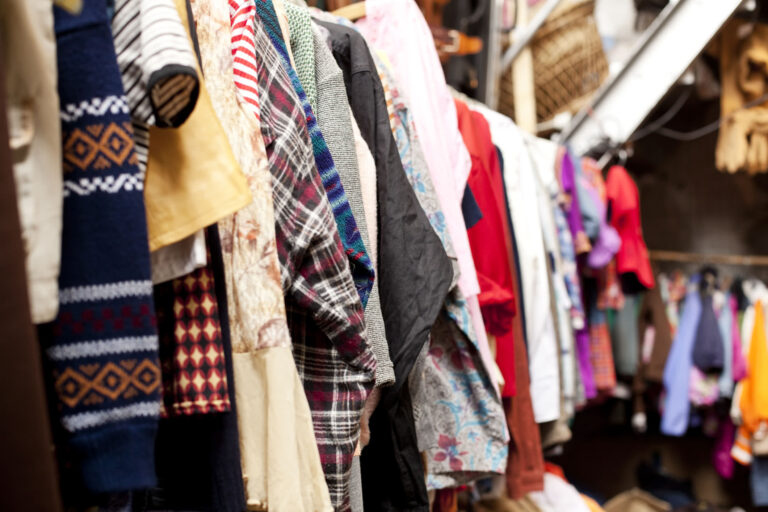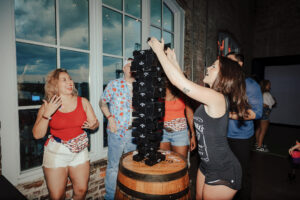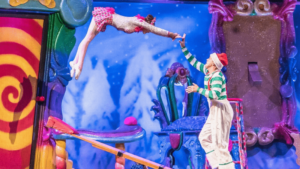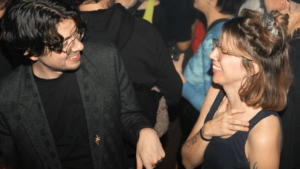London Fashion Week events are famed for their glamour and broad appeal. While the world’s eyes are focused on the UK capital every February and September, any event taking place around the same time can benefit from the extra attention and allure. Retailers, student organisations, and charities all use the spotlight to bring awareness to their LFW events.
Hosting your own event? We’ve interviewed industry experts and researched some of the most successful LFW functions to offer inspiration and practical advice when planning fashion events.
Planning a fashion show event
The obvious opportunity for organisers during LFW is to host a fashion show. Designers and brands spring to prominence at a time when influencers, celebrities, and the world’s media are all competing to discover the next big thing.
Fashion events already have a large, international, and engaged audience. This means that any shows that can capture the imagination between runway events have the potential to draw a significant – and highly-targeted – crowd.
Creating a fashion showcase
With all the excitement and dynamism of fashion week, don’t lose sight of the basics! If you’re a designer or working for one, you’ll likely know the type of fashion you’ll be showcasing. Brands looking to team up with other designers should ensure their messaging and values align before planning a combined showcase event.
Working with creative directors
For those still relatively new to fashion events, expert help from stylists and creative directors can be a game changer. They can make sure your theme is relevant and on-trend, that your respective brand messages don’t conflict, and bring together industry professionals who’ll be essential to your event running smoothly.
If you’re an organisation promoting talented designers and similar creatives, you’ll find plenty of inspiration at the Graduate Fashion Foundation. Every year, they present Graduate Fashion Week at the same time as London Fashion Week to showcase the world’s largest collection of graduate (BA) level fashion designers.
How to organise a fashion show event: 5 key steps
We’ve listed five essential steps to show you how to plan an exceptional fashion event.
1. Choose your theme
All cohesive fashion shows have an overarching theme, connecting each outfit that appears on the runway beyond just “Spring” and “Autumn”. For example, many designers are currently creating clothing with political and environmental slogans. Models frequently walk the catwalk emblazoned with messages – consistent throughout entire collections.
2. Be firm with your budget
At creative events, it’s easy to get carried away and overspend, so try to save where you can. Secure a sponsor for the event if your budget needs a cash injection, and give them ad space if you’re producing a fashion show event programme.
3. Secure your fashion show venue
Ideally, you want a long, rectangular space to provide plenty of room for a runway, press, and guests. This will avoid leaving the sides of the room empty and sending the message that you couldn’t fill the space. Venues with bars are desirable, especially if you want to keep initial outlay spending down by striking a minimum-spend deal with the owners instead of paying a hire fee.
4. Select your clothing and models
To keep costs down, persuade designers to donate clothing in exchange for the publicity the event will bring to their new lines – just don’t compromise on your overall theme. Similarly, advertise for volunteer models, or go to an agency.
5. Schedule a practice run
This is an important final step before the big day; models must try on the clothes to ensure they fit and know the exact timings for walking down the runway. Don’t forget to test the lighting, too – this is a good chance for a general tech rehearsal.
Fashion retail event ideas
As new trends hit the runway, there’s often a delay between LFW and the official release of new designs. This presents a huge opportunity for retail event organisers to capitalise on a highly engaged and aspirational audience.
Here’s some expert advice and guidance for tapping into that market.
Holding a London Fashion Week pop-up shop
Pop-ups are a savvy way for creators of fashion retail events to maximise the association between particular brands and LFW.
Whether you choose to tease a collection before its release to create a brand buzz or go straight for a pop-up shop, only you will know what’s right for your organisation. If you prefer to start selling to a captive audience during LFW, consider these planning points in advance:
- What marketing have you done ahead of LFW to ensure your pop-up shop will be packed throughout the week?
- Have you factored in all relevant costs of hiring a suitable venue during such a busy time?
- Have you ensured the selected brands reflect the new season’s major themes and styles?
If you can answer all of those questions, you could be ready to launch your pop-up shop. Even so, consider seeking out experts to help with key logistics.
Creating a London Fashion Week partnership event
If you’re thinking about bringing in outside expertise, team up with another brand for a partnership event. London Fashion Week events often have two or more partners collaborating on a compatible, non-competitive basis to ensure mutual success.
Planning a collaborative fashion event
Partnerships can be unique opportunities and resonate with the spirit of a one-off event. For instance, fashion shows frequently host hair styling and/or make-up demonstrations alongside catwalks to help aspirational attendees visualise their new look. For fashion businesses, collaborating with another designer might spawn a new collection of garments or accessories. The Store by Ida set up an excellent example of this recently when the fashion resale platform collaborated with contemporary artist Kimi Zoet for “an evening of unusual storytelling”. It featured some of the artist’s characters styled in items taken from Ida’s wardrobe.
Even brands with no apparent connection to fashion can benefit from a creative collaboration in the context of London Fashion Week events. Cafés, for example, can emphasise their relationship with the creative community by partnering with designers for custom coffee cups or special merchandise.
Planning an immersive fashion show event
Immersive events bring products to life and help audiences experience the influences behind collections or designs. While runway shows are the typical way to show new styles, more businesses are developing an immersive approach to bring potential buyers into their brand narrative.
Event organisers The Eclectives used this approach for their fashion show, The Craft After 8: Immersive Sound Escape & Networking. As co-founder Isabella Faye says, “The Craft After 8… took place before Halloween, so [it had] a witchcraft theme, going from old-fashioned designs to modern, all outsourced from independent designers. After COVID-19, our group saw how important it was to get people interacting with each other, themselves, and creativity… [So,] by including more than just fashion, we’re able to bring a wide variety of creatives together, to celebrate and showcase their talents.”
“Our community is what inspires our events, so stop listening to tradition and start listening to those around you. Think outside of the box and explore new ways of celebrating creativity.”
Hosting a vintage fashion event
Themed fashion events also help to create a sense of participation among audiences. Vintage shows are thematic, but there are many ways to encourage your guests to embrace the spirit of the event beyond simple attendance. Swap shops are a popular component of vintage fairs, as are live models who can bring an old-fashioned style to life.
Sticking to a particular theme or decade within the context of a vintage fair focuses the minds of purchase-oriented attendees. Frock Me!, London’s original vintage fair, offers vintage styles from many eras but emphasises that their events are “the perfect place to find 1920s fashion”.
Adopting trade practices or anything unfamiliar to the typical high-street shopper provides an edge with bargain-conscious guests. We are., another vintage pop-up, uses an unconventional approach to pricing, offering second-hand clothes by weight rather than by item.
How do you organise a fashion event for London Fashion Week?
Once you’ve decided which elements to incorporate into your LFW event, you’ll be ready to prepare in detail. For a successful event, have all the logistical aspects organised before you get ready to launch.
Let’s look at some of the key elements creators need to consider before unveiling their London Fashion Week events:
Finding a unique theme
Make sure your event’s theme corresponds to the product or experience on offer. A street-style event will have a very different theme from a haute couture showcase. Couturiers DUMEBI demonstrate this by marketing their shows as “soirées” that feature cocktails and live entertainment. This allows them to display their creations in an appropriately upmarket setting.
Location, location, location
Keep your audience and theme in mind when deciding your event’s location. London’s Lone Design Club stresses its sartorial credentials by hosting its events “…at the heart of Knightsbridge, just a minute’s walk from Harrods”. With a venue so close to one of London’s best-known couture retailers, they position themselves as credible, upmarket fashionistas and cater to a wealthy, international crowd.
Perfect timing
Knowing when to stage your event is just as important as planning your entertainment. A networking event can work well as a weekday lunch; a showcase with music and dancing is better suited to a weekend evening. Designer Mark Johnson hosts his fashion show, The Beauty of Africa, on a Saturday evening at a specific time. The weekend slot works best for the performance elements of his show – music and poetry – and the specific start time ensures everything runs smoothly.
Organise your fashion show event programme
International visitors to LFW will have busy diaries during the week itself, so you’ll need to plan around significant shows. Fashion week afterparties are common after major runway events, so organising a party in collaboration with a drinks partner and/or with a musical component is a good option.
Marketing
When marketing for LFW events, leverage insights into your audience and the kind of platforms fashion fans use. Social media marketing can be highly effective, so engage fashionistas on visual platforms like Instagram, TikTok, and Pinterest.
Take your event to LFW
Ready to launch your London Fashion Week event? Take the stress out of ticketing by signing up to host it with Eventbrite. So your LFW event stands out from the rest, consider marketing it with the help of Eventbrite Boost’s promotional tools.





